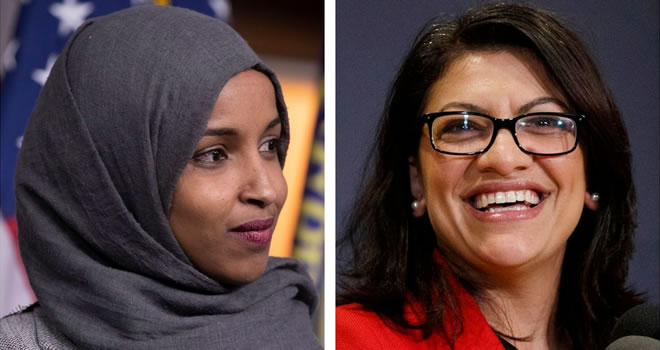By Michelle Boorstein, Marisa Iati and Julie Zauzmer
Thursday January 3, 2019

Ilhan Omar (D-Minn.), left, and Rashida Tlaib (D-Mich.) are the first Muslim women elected to Congress. (Carolyn Kaster/AP)
Khadra Mohamud stood in Rep. Ilhan Omar’s brand-new congressional office Thursday, taking in a new scene in American politics — a crowd of supporters, the majority of them women, many of them in hijabs, celebrating the swearing-in of a Muslim woman as a member of Congress.
“[This means] everything to us,” said Mohamud, 28, who volunteered for Omar’s campaign and traveled from the Democrat’s state of Minnesota to be there for her swearing-in. “It means we can get into politics and make it to the highest level.”
Not far away, a similar scene was unfolding in the office of Rep. Rashida Tlaib (D-Mich.). Omar and Tlaib were elected in November, in the midterm elections that swept in a more diverse and more female class of representatives. The two are the first women of their faith elected to Congress.
“I wanted my kids to be here to witness this,” Huwaida Arraf, a Palestinian American human rights lawyer, said as her 4-year-old daughter squirmed on her lap.
Inside both offices, supporters watched the legislators take the oath of office at the nearby Capitol on a live stream. Many more Muslims across the country watched live streams on C-SPAN and Facebook. Some posted photos of themselves wearing thobes, the traditional Palestinian gown that Tlaib wore to the ceremony, using the hashtag #TweetYourThobe to proclaim their pride.
As Zaha Hassan pulled on a patterned red, orange and white gown, she said Tlaib’s swearing-in helped contradict negative perceptions of Palestinian Americans. “What she represents to me is a shattering of the walls that kept us from participating” in politics, said Hassan, who works at the Carnegie Endowment for International Peace. Despite a resurgence in nativism in the United States and abroad that Hassan called “troubling,” she said Thursday symbolized “the hope of something better.”
Two Muslim men have been elected to Congress previously: Keith Ellison, who just ended his term representing Minnesota and was elected the state’s attorney general; and Rep. André Carson of Indiana. All four are Democrats.
The women, who both served in their state legislatures before running for Congress, have been open about their religion. Omar used the Arabic phrase “alhamdulillah,” meaning “all praise to God,” in her victory speech on Election Night. They ran on progressive platforms — Tlaib touted plans for a $15 minimum wage; Omar wanted universal health care and tuition-free colleges.
Some women who flocked to Capitol Hill on Thursday to celebrate Tlaib and Omar’s swearing-in said they were particularly moved to see women raised all their lives in the Muslim community elected to Congress. (Ellison and Carson converted to Islam.)
Ethnic pride in the new congresswomen — Somali Americans supporting Omar, Palestinian Americans supporting Tlaib — blended with their religious pride.
“The American Muslim community is definitely one of the most diverse, if not the most diverse, religious community in America,” said Arsalan Suleman, a former U.S. envoy to the Organization of Islamic Cooperation. “You definitely have the broader positive and excited response from the Muslim American community, but for specific communities, as well, their victory and their election has been extremely meaningful and empowering.”
He said that their election underscores a broader trend of young Muslims taking greater interest in getting involved in American politics. “We’re sort of seen through the lens of security, always — counterterrorism or countering extremism,” he said. “Part of the excitement and joy that people have, seeing these two women being sworn in, is they’re showing … that’s not the reality of Muslim American life.” Instead, Suleman said, Tlaib and Omar focused their campaigns on issues that many Muslims are most concerned about, including health care — issues that hew closely to those that other Americans worry about.
Among the people snacking on cupcakes and coffee in Omar’s packed office Thursday was Halimo Ahmed, a prominent Somali singer and friend of Omar’s family who traveled from her home in Finland.
“She will open a lot of doors,” Ahmed said, holding up her hands to show her special henna for the occasion. “The whole world looks up to America, and she is part of that. … You hear women can’t do this or that. It’s not right. It’s not right, the image of Muslim men [as sexist]. Muslim women can be in positions of power.”
Omar proves that, she said.
Sumra Khan, 20, came to Omar’s office with her father from Catonsville, Md. Gripping the hijab around her face, Khan said she normally tells friends with politics aspirations: “I say: ‘You’ll get so far and then you’ll get stuck’” — implying the outward sign of their culture would be a hindrance. Now, she feels more hopeful for their chances.
James Zogby, founder of the Arab American Institute, was also in the office. Zogby is Catholic but said the two women inspire members of many minority ethnic communities, not just those of their religion. Omar’s late mother was Somali-Yemeni. “It’s as if she goes to Congress and they go with her. It’s a validation and really uplifting. We can be there, too,” he said.
A group of Christian clergy, including leaders in the United Church of Christ and United Methodist denominations, planned to deliver a welcome letter on Thursday afternoon to the two Muslim representatives signed by 7,000 Christians.
Suleman had a simple summation of what the moment represents: “I think the message, really, is that this is America.”














